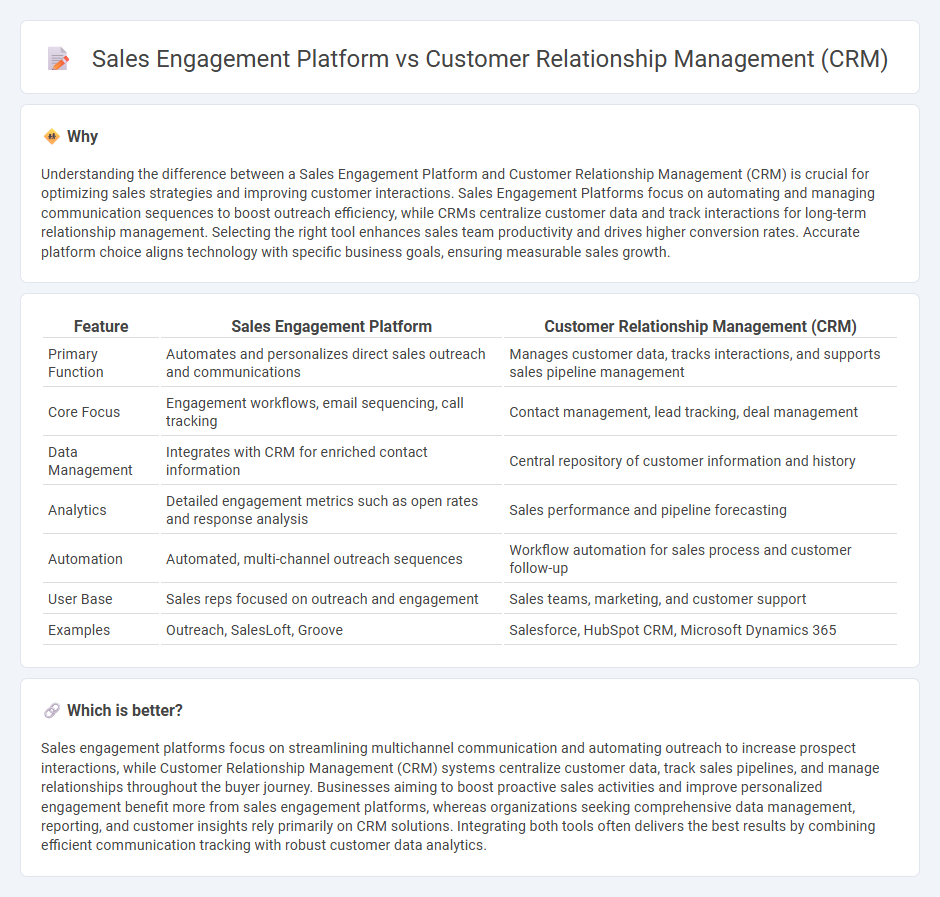
Sales engagement platforms automate and streamline communication workflows to boost prospect interactions and accelerate deal closures, focusing on multi-channel outreach and real-time tracking. Customer Relationship Management (CRM) systems centralize customer data, manage sales pipelines, and analyze customer behavior to enhance relationship building and long-term retention. Discover how integrating both tools can transform your sales strategy and improve overall performance.
Why it is important
Understanding the difference between a Sales Engagement Platform and Customer Relationship Management (CRM) is crucial for optimizing sales strategies and improving customer interactions. Sales Engagement Platforms focus on automating and managing communication sequences to boost outreach efficiency, while CRMs centralize customer data and track interactions for long-term relationship management. Selecting the right tool enhances sales team productivity and drives higher conversion rates. Accurate platform choice aligns technology with specific business goals, ensuring measurable sales growth.
Comparison Table
| Feature | Sales Engagement Platform | Customer Relationship Management (CRM) |
|---|---|---|
| Primary Function | Automates and personalizes direct sales outreach and communications | Manages customer data, tracks interactions, and supports sales pipeline management |
| Core Focus | Engagement workflows, email sequencing, call tracking | Contact management, lead tracking, deal management |
| Data Management | Integrates with CRM for enriched contact information | Central repository of customer information and history |
| Analytics | Detailed engagement metrics such as open rates and response analysis | Sales performance and pipeline forecasting |
| Automation | Automated, multi-channel outreach sequences | Workflow automation for sales process and customer follow-up |
| User Base | Sales reps focused on outreach and engagement | Sales teams, marketing, and customer support |
| Examples | Outreach, SalesLoft, Groove | Salesforce, HubSpot CRM, Microsoft Dynamics 365 |
Which is better?
Sales engagement platforms focus on streamlining multichannel communication and automating outreach to increase prospect interactions, while Customer Relationship Management (CRM) systems centralize customer data, track sales pipelines, and manage relationships throughout the buyer journey. Businesses aiming to boost proactive sales activities and improve personalized engagement benefit more from sales engagement platforms, whereas organizations seeking comprehensive data management, reporting, and customer insights rely primarily on CRM solutions. Integrating both tools often delivers the best results by combining efficient communication tracking with robust customer data analytics.
Connection
Sales engagement platforms integrate seamlessly with Customer Relationship Management (CRM) systems to streamline communication tracking, automate outreach, and enhance lead management. By syncing customer data and interaction history, these tools enable sales teams to deliver personalized follow-ups and optimize pipeline visibility. The combined use of sales engagement platforms and CRM drives higher conversion rates and improves overall sales performance.
Key Terms
Lead Tracking
Customer Relationship Management (CRM) systems centralize lead tracking by storing detailed customer data, interaction history, and sales pipeline status, enabling organizations to manage relationships efficiently and forecast revenue. Sales engagement platforms complement this by automating and optimizing outreach activities, providing real-time engagement metrics that help sales teams prioritize leads and improve conversion rates. Explore the key differences and benefits of each tool to enhance your lead tracking strategy.
Automation
Customer Relationship Management (CRM) systems centralize customer information and automate core processes like contact management, lead tracking, and reporting to streamline sales and marketing efforts. Sales engagement platforms emphasize automating communication workflows such as email sequencing, call scheduling, and task reminders to enhance direct interactions with prospects and boost conversion rates. Explore detailed comparisons to understand how automation in CRM and sales engagement platforms can transform your revenue operations.
Integration
Customer Relationship Management (CRM) systems centralize customer data and automate sales processes, enhancing overall relationship management and long-term customer retention. Sales engagement platforms specialize in streamlining communication workflows and improving real-time interactions between sales teams and prospects through multi-channel integration. Explore how integrating CRM with sales engagement platforms can maximize efficiency and boost revenue by uniting data management with personalized outreach strategies. Learn more about optimizing your sales ecosystem today.
Source and External Links
What is CRM (Customer Relationship Management)? - CRM is a combination of practices, strategies, and technologies used by companies to manage and analyze customer interactions and data throughout the customer lifecycle to improve customer relationships, retention, and drive sales growth, including types like operational, analytical, and collaborative CRM.
customer relationship management (CRM) - CRM involves integrated technologies to document, track, and manage interactions with customers and prospects, supporting sales processes, lead management, forecasting, and improving customer experience across various business functions.
What is CRM (customer relationship management)? Full guide - CRM tools help sales teams track and drive revenue by centralizing customer interactions and sales activities, automating workflows, and providing pipeline visibility to boost productivity and improve customer relationship management.
 dowidth.com
dowidth.com